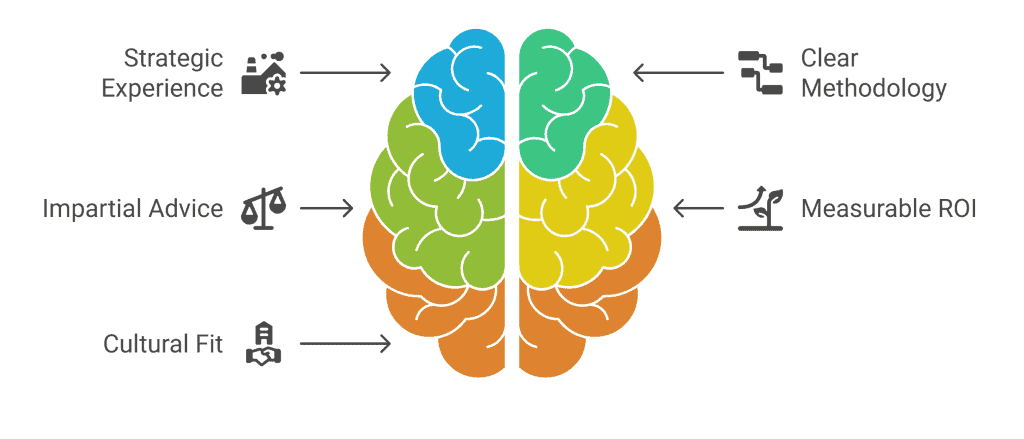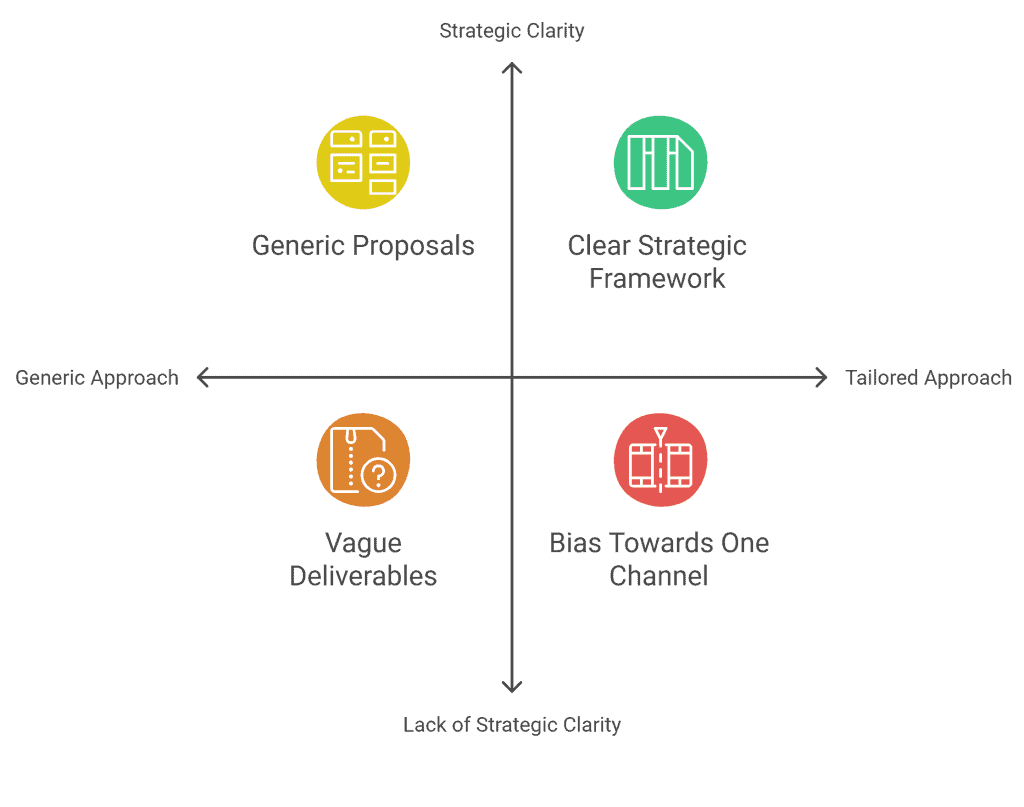Become a Marketing Consultant, How To:
How to Hire the Right Marketing Consultant for Your SME

Why the Right Marketing Consultant is Critical for SME Success
Hiring the right marketing consultant can be one of the most commercially significant decisions an SME makes. Marketing spend is often a substantial part of the budget for growing businesses, but without the right strategic oversight, much of it risks being wasted on disjointed, ineffective, or misaligned activities. A marketing consultant’s job isn’t simply to advise on promotional channels; it’s to help a business define where it sits in the market, who it should speak to, what it should say, and how to generate measurable growth.
SMEs rarely have the luxury of large in-house marketing teams, making this external expertise not just valuable but necessary. With hundreds of consultants offering varying levels of service and many blurring the lines between strategy and execution, it’s essential to know how to choose wisely.
Opportunity Marketing helps ambitious SME business owners make smarter, more confident marketing decisions through structured, impartial, and commercially focused consultancy. Our strategy-first approach delivers clear, actionable marketing plans that eliminate waste, improve ROI, and align every activity with your business goals. Whether you need a full marketing strategy, outsourced support, or mentoring to develop internal capability, we provide the expertise and clarity your business needs to grow sustainably. Contact Us: 0333 320 4108 or info@opportunitymarketing.co.uk
Understanding What a Marketing Consultant Actually Does
Marketing consultants work closely with business owners and directors to develop marketing strategies that are grounded in research, aligned with commercial objectives, and focused on generating results. Unlike a marketing agency, which typically sells services such as SEO, PPC, design, or content creation, a consultant starts further upstream.
The consultant’s role involves thoroughly understanding the business, including its values, product or service offerings, target customers, and market dynamics. They define strategic direction before any marketing activity begins. Their output might include a marketing strategy document, an implementation plan, or recommendations on positioning and messaging. Consultants may also project-manage activity, help recruit or mentor junior marketing staff, or provide high-level board-level input as a fractional marketing director.
What they don’t do is pitch creative campaigns or channel-specific solutions in isolation. This distinction matters. SMEs looking to fix underperforming marketing often find the issue lies not with the execution but with the absence of a cohesive strategy.

Knowing When Your SME Needs a Marketing Consultant
Many SME owners delay bringing in a marketing consultant until they feel something is broken. Yet the right time to bring in this expertise is often before major marketing investment takes place or when growth ambitions demand clarity and structure.
Several signs point to the need for external strategic support:
- You’re spending money on marketing without knowing what’s working or why.
- Your internal marketing resource is limited, junior, or non-existent.
- You feel overwhelmed managing multiple agencies or suppliers with no unified plan.
- There’s no clear articulation of your brand’s value proposition or positioning.
- Your marketing feels reactive rather than planned.
Choosing a consultant at this stage can prevent poor decision-making, reduce wasted spending, and provide the strategic clarity needed to maximise the return from every marketing activity moving forward.
What to Look For in a Marketing Consultant
Selecting the right marketing consultant starts with deciding what attributes to prioritise. A strong consultant combines commercial experience, structured methodology, and a strategic mindset focused on growth and results.
Look for these attributes:
1. Strategic Experience Across Sectors
A consultant with experience across multiple industries often brings a broader commercial view and fresh thinking. They’re more likely to question assumptions and recommend solutions that aren’t tied to the norms of a particular sector. For SMEs, their input often leads to breakthroughs in positioning and targeting.
2. Clear, Proven Methodology
Consultants should have a defined process they follow with every client. Whether it’s a marketing audit, a structured Fast Track Marketing Plan, or a full strategic development framework, transparency in their approach demonstrates professionalism and structure, not guesswork or templates.
3. No Vested Interests in Execution
Be cautious of consultants who also sell executional services (such as SEO, web design, or PPC) as part of their package. While some do this well, many offer advice skewed towards the services they profit from. A strategic consultant should offer impartial recommendations based solely on what is right for your business.
4. Track Record of Measurable ROI
Case studies and testimonials speak volumes. Ask to see evidence of how their recommendations helped past clients grow, improve performance, or make better marketing decisions.
5. Fit with Your Business Ethos and Culture
Personality and communication style matter. A consultant will spend significant time with your senior team, so alignment on values, pace, and expectations is critical. Trust and rapport can’t be underestimated when the goal is long-term growth.

Understanding the Right Process: How a Strategic Consultant Works
A good consultant doesn’t just bring experience; they bring structure. The right process transforms ideas into actions and confusion into clarity. Here’s how that typically looks in an SME engagement:
Step 1: Discovery and Research
This is the foundation. Consultants conduct internal audits, review performance metrics, analyse financial data, and look at customer behaviour. They also research competitors, marketplace trends, and positioning strategies. Every recommendation stems from this evidence base.
Step 2: Strategic Definition
Once the data is in place, the consultant works to define:
- Target audience segments and personas.
- Defining the value proposition and positioning of the audience.
- Key messaging pillars and tone of voice.
- Commercial objectives and marketing priorities.
Step 3: Planning and Roadmapping
The output of strategic definition is a clear 12–36 month marketing roadmap. This includes:
- Recommended channels.
- Campaign timing and structure.
- Budget and resource planning.
- KPI frameworks and success metrics.
Step 4: Implementation Support
Many consultants extend their services beyond just strategy development. They also offer implementation management, supplier briefing, marketing mentoring, or fractional director support. Such assistance transforms the strategy into action and helps avoid the common problem of strategies gathering dust in a drawer.
Step 5: Ongoing Measurement and Refinement
Performances must be tracked, reviewed, and optimised. The right consultant will build in a review process to adjust tactics in response to results, ensuring your activity remains commercially relevant.
Questions Every SME Should Ask Before Hiring a Consultant
Choosing a marketing consultant is more than just outsourcing a task; it’s about entrusting someone with shaping the direction of your business’s growth. The wrong appointment could result in misaligned activity, wasted spend, or lost opportunities.
Asking the right questions during your evaluation process is crucial to finding a consultant who aligns with your commercial goals, understands your sector, and brings a structured, unbiased approach to marketing strategy. The following questions will help you assess credibility, process, suitability, and long-term value.
What is your exact process for developing marketing strategies?
This question tests whether the consultant has a clearly defined and structured methodology. A good consultant should be able to guide you through the steps of discovery, research, planning, and implementation. Look for specifics like audience analysis, competitive benchmarking, messaging frameworks, and activity planning. A lack of structure may signal guesswork or one-size-fits-all approaches, which are unlikely to deliver meaningful results for your SME.
Do you have examples of similar businesses you’ve helped? What were the outcomes?
Case studies and past project examples are essential indicators of a consultant’s experience and effectiveness. Ask to see tangible results, whether that’s revenue growth, lead generation, clearer positioning, or improved return on investment. While it’s not essential that they’ve worked in your exact industry, understanding how they’ve solved similar marketing challenges gives you insight into their commercial thinking and adaptability.
Are your recommendations impartial, or are they linked to other services you provide?
Impartiality is a major differentiator between strategic consultants and many agencies. This question helps you identify whether a consultant might be incentivised to steer you towards certain tactics, like SEO, PPC, or design, because they also sell those services. A truly strategic consultant will make decisions based solely on your business’s needs, without any hidden agendas or commercial bias.

Will you be involved after the strategy is written, or is your role purely advisory?
Marketing strategy without implementation support often results in stalled progress. Some consultants hand over a plan and move on. Others, like Opportunity Marketing, stay involved to manage the delivery, mentor staff, or guide third-party suppliers. If you want your strategy to lead to action and results, it’s important to know what level of ongoing support is available, and whether the consultant is committed to seeing recommendations through.
How do you work with internal teams or external suppliers?
A successful consultant must collaborate effectively with existing resources. This includes your in-house staff, who may have varying levels of marketing experience, as well as any external partners, such as digital agencies, PR firms, or web developers. Ask how the consultant supports, briefs, and aligns others involved in delivery. You’re looking for someone who can act as a project manager or strategic lead, not just offer theoretical guidance from the sidelines.
What does success look like, and how will we measure it?
This question is about defining expectations and outcomes from the outset. A professional marketing consultantation should help you establish clear marketing KPIs such as lead volume, customer acquisition cost, website conversion rate, or revenue growth linked to marketing. They should also explain how performance will be tracked, how often reviews will occur, and what happens if the activity isn’t working. Without this clarity, it becomes hard to justify continued investment.
These questions help clarify scope, expectations, and cultural fit. A transparent consultant will welcome them and likely have their set of questions to better understand your needs. The right partnership is built on mutual understanding, open communication, and a shared commitment to measurable results. SMEs should feel empowered to probe deeply before making a hiring decision. After all, a strategic consultant isn’t just a service provider; they are a growth partner.
What to Avoid: Red Flags and Common Pitfalls
Hiring the wrong marketing consultant can lead to misaligned priorities, wasted budget, and a lack of strategic clarity. While many consultants offer valuable insights, there are also those who overpromise, underdeliver, or apply a cookie-cutter approach that doesn’t serve the unique needs of your SME. Recognising the warning signs early in your selection process can protect your business from avoidable setbacks and underperformance.

Generic Proposals or Templates
Each SME has its market dynamics, commercial pressures, and customer base. A consultant who presents a ready-made strategy or generic template likely hasn’t taken the time to understand your specific needs. Tailored thinking is what drives results. Be cautious if you see recycled formats, minimal discovery time, or boilerplate documentation; these are signs of a formulaic approach lacking true strategic depth.
Bias Towards One Channel
Strategic marketing should be holistic. If a consultant pushes a single tactic like Facebook ads, Google PPC, or email automation as a universal solution, they may be operating from a limited perspective. SMEs benefit from a consultant who assesses all options and recommends a marketing mix based on audience behaviour, commercial goals, and available budgets. A narrow, channel-specific mindset often indicates the consultant’s own commercial interests are at play.
No Clear Strategic Framework
A structured methodology is essential. Without a clearly defined process for researching, analysing, planning, and implementing, strategies often become vague or disconnected. Look for a consultant who can explain their strategic process step by step, from internal audits and competitor research through to activity roadmaps and performance tracking. A lack of a framework often results in inconsistent outcomes and confusion among your team.
Lack of Commercial Focus
Avoid consultants who speak primarily in creative jargon or abstract marketing theory but can’t tie their work to measurable business results. Strategic marketing must connect directly with commercial outcomes such as revenue growth, lead generation, profit margin improvement, and customer lifetime value. If a consultant struggles to link ideas to tangible impact, they may not be equipped to contribute meaningfully to business performance.
Vague Deliverables
You should always know what you’re getting, when, and in what format. Consultants who can’t clearly describe what their service includes or who offer vague terms like “strategy session” or “marketing support” without detail creates room for misunderstanding.
Request clarity upfront:
- Will there be a written marketing plan?
- Will you receive a 12-month activity calendar, messaging frameworks, or brand positioning documents?
- Specific deliverables show maturity, structure, and transparency.
The Return on Investment: What the Right Consultant Brings
A well-qualified strategic marketing consultant doesn’t just create plans; they help SMEs maximise their marketing investment, create internal alignment, and establish a foundation for long-term success. Their value lies in turning strategy into commercial advantage, helping business owners make confident, informed decisions across all aspects of their marketing activity. The benefits are tangible and wide-reaching.
Higher ROI from All Marketing Spend
With a clear understanding of your goals and audience, the consultant identifies the right tactics before any money is spent. This eliminates guesswork and misalignment. When the marketing mix is built on data, insight, and commercial logic, each campaign is more targeted and cost-effective, delivering stronger returns from the same or even reduced budgets.

Improved Commercial Clarity
Marketing activity should never happen in isolation. A successful consultant aligns messaging, targeting, pricing, and brand positioning with your business model, growth plans, and customer needs. Such alignment creates consistency across all communications and helps avoid scattergun efforts that confuse audiences. Commercial clarity means everyone in the business understands how marketing supports wider business objectives.
Fewer Costly Mistakes
Marketing missteps can be expensive. Whether it’s hiring the wrong agency, launching a product without market demand, or spending on tactics that don’t convert, the financial impact adds up. A consultant provides the strategic lens to guide decisions, preventing rushed activity or supplier misdirection. With a roadmap in place, businesses reduce the risk of misfires and make smarter, evidence-led investments.
Internal Upskilling
SMEs often lack in-house marketing leadership. Many consultants step in to mentor junior staff, support internal capability building, or help business owners become more confident in strategic decision-making. Such leadership not only drives immediate progress but also leaves the business stronger and more self-sufficient in the long term, which is especially valuable in businesses looking to scale sustainably.
Scalable Growth
Whether your ambition is to grow your customer base, enter new markets, or expand product offerings, strategic groundwork is vital. A consultant helps define what that growth should look like, what’s needed to support it, and how to execute it at scale without losing efficiency. With a robust plan in place, SMEs can scale operations in a controlled, manageable, and profitable way.
Why SMEs Should Consider Working with Opportunity Marketing
Opportunity Marketing specialises in helping small businesses build effective, ROI-focused marketing strategies. We don’t sell executional services like SEO, PPC, or branding, so our advice is impartial, data-led, and 100% tailored to the commercial goals of your business.
Our Fast Track Marketing Plan provides a complete marketing strategy within four weeks. It includes a clearly defined roadmap, commercial objectives, messaging structure, audience segmentation, and an actionable implementation plan. Whether you want us to help manage delivery, support your junior team through mentoring, or simply provide clarity on your strategic direction, our services are flexible, affordable, and proven to generate results.
Unlike many consultants, we also stay involved in the process to help our clients execute the plan and track performance. Our clients span sectors from professional services and manufacturing to software, education, and healthcare, yet they all share one thing in common: ambition.

Marketing Strategy is Not a Luxury It’s a Priority
Hiring a marketing consultant might feel like a luxury for an SME focused on costs and growth, but the reality is the opposite. A strategy-first approach is what allows you to avoid waste, choose the right path, and invest where it counts.
Without strategy, marketing is guesswork. With it, every pound works harder, every activity has purpose, and growth becomes sustainable. Whether you’re just beginning your marketing efforts or you’re spending but not seeing a return, the right consultant can make the difference between stagnation and measurable success.
Make the decision that puts clarity and confidence at the heart of your business growth.
Work With Opportunity Marketing
Are you in search of a reliable partner who can provide structure, insight, and tangible outcomes?
At Opportunity Marketing, we provide SME-focused strategic marketing consultancy designed to generate measurable business growth. Whether you need a strategy created from scratch, implementation support, or mentoring for your in-house team, we’re here to guide and support every step of the way.
Whether you require a fully bespoke marketing strategy, outsourced marketing support, or expert mentoring for your internal team, our independent and impartial consultancy will give you the clarity, confidence, and structure you need to move forward.📍 Visit: opportunitymarketing.co.uk
📞 Call: 0333 320 4108
📧 Email: info@opportunitymarketing.co.uk


Ian Kirk
Founder at Opportunity Marketing
Ian is the founder of Opportunity Marketing marketing, with over 18 years of experience in successfully setting up marketing departments, creating marketing strategies and implementing these strategies across a wide number of SME companies in both the B2B and B2C sectors through a variety of channels.






